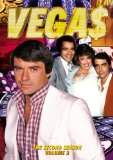| Reviews & Columns |
|
Reviews DVD TV on DVD Blu-ray 4K UHD International DVDs In Theaters Reviews by Studio Video Games Features Collector Series DVDs Easter Egg Database Interviews DVD Talk Radio Feature Articles Columns Anime Talk DVD Savant Horror DVDs The M.O.D. Squad Art House HD Talk Silent DVD
|
DVD Talk Forum |
|
|
| Resources |
|
DVD Price Search Customer Service #'s RCE Info Links |
|
Columns
|
|
|
Vega$: The Second Season, Volume Two (Vegas)
The odds for a good time are a little better in this second half of the second season of the rapidly-sinking Vega$. CBS Video and Paramount, bucking the M.O.D. trend by still mass-producing marginal library titles such as this, have released Vega$: The Second Season, Volume 2, a three-disc, 11-episode collection that includes the final offerings of the 1979-1980 season of this fondly-remembered series. No significant changes here from the first half of the season...but some of the episodes do score in a pulpy, enjoyably trashy, disposable TV-way, and that will be enough for fans of the series.
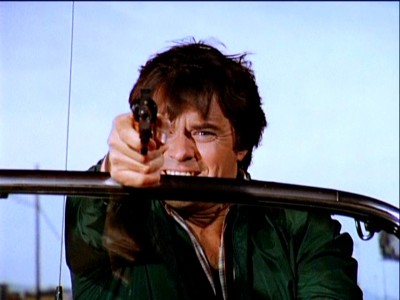
Welcome to Las Vegas, Nevada, circa 1980, where breakfast will set you back .99 cents, gas is .65 cents a gallon, and the desert still comes right up to the Strip. Life is good there for Vegas' best-known private dick, Dan Tanna (Robert Urich). Still on retainer with Desert Inn Resort and Country Club to smooth over any problems that might arise at the Inn from assorted chiselers, sharpies, conmen, boosters, shake-down artists and more hard-core criminals (although owner Philip "Slick" Roth, played by Tony Curtis, is nowhere to be seen in these 11 episodes), Dan is free to pursue other interests and cases as he tools around town in his vintage cherry-red '57 Ford T-Bird. When it's time to go home after a busy day of being handsome, Dan pulls right into his apartment, which just so happens to be a converted theatrical storage warehouse for the Desert Inn. His T-Bird safely tucked away, Dan hops out of his ride and strolls into his groovily-appointed bachelor pad where his staff awaits. This being Vegas, Dan's professional staff naturally consists of a former hustler and a chorus girl: hangdog goofball Binzer (Bart Braverman), and gorgeous, top-heavy secretary, Beatrice Travis, played by now-brunette Phyllis Davis. Official help for Dan's investigations comes from Metro cop Lieutenant David Nelson (Greg Morris), who drops last season's threatening demeanor to become more simpatico with Dan's methods of investigation: wait for a phone call, drive around the Strip, check his look in the rearview mirror, smash a goon in the face, and make love to a beautiful woman, before he pulls his piece (his other piece, naughty) to blow up the bad guy.
SPOILERS WARNING
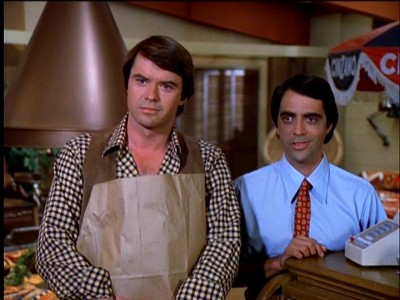
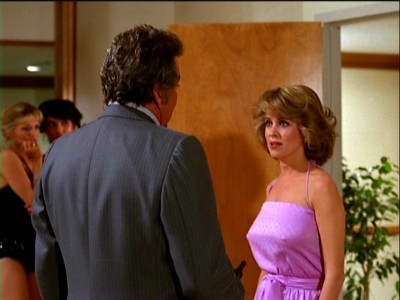
I wrote a fairly detailed look at the first season and a half of Vega$ in my previous three reviews, so I'm not going to rehash the same points here...not the least reason being that this second half of the second go-around of Vega$ covers almost exactly the same ground as season one...just without the energy. I'm an unabashed fan of producer Aaron Spelling's work, so I don't look down my nose at disposable entertainment like Vega$. I take it for what it was (and is): good-looking trash that wasn't intended to do anything other than entertain an audience at 10:00pm on Wednesday nights, right after Charlie's Angels. And I'm not going to dump on handsome, competent Robert Urich, either, just because he's not De Niro, or because he didn't star in something more substantial or respected in his career like Law and Order (trust me: deep down, De Niro would have killed to be 6 foot 3 and charming as hell in 1979).
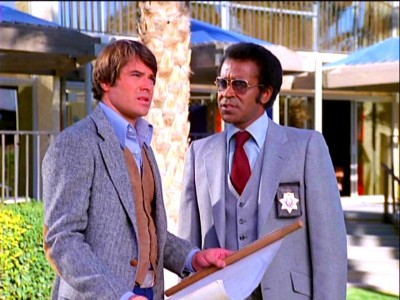
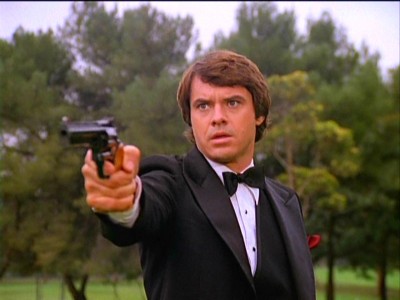
No, what bothers me about Vega$ this 1979-1980 season isn't that it's entirely the same as the first season--that would be fine; with this kind of TV, the best stories are the most familiar ones. Rather, I was disappointed that what was familiar, seemed so...flaccid in execution. In my Volume 1 review of this second season, I wondered if things would pick up a bit in the second half...and luckily, they do. Stories are bit more solid, a bit more florid...but Urich still looks bored; he's clearly on auto-pilot. First and foremost, with a series like Vega$, the lead performer sets the tone for the whole shebang. Urich is in almost every shot, and since these stories are invariably lightweight or overly-familiar to the point of cliché (this is Spelling, after all), a lot of the burden to make the show interesting rests on his broad shoulders. So if Robert Urich looks glum and acts less playful and moves along a little more slowly this time out...then Vega$ looks glum and acts less playful and moves along a little more slowly this time out. Who knows what's going on with an actor in a show, but it couldn't have escaped Urich's attention that the premiere season of his first-starring series didn't exactly burn down the Nielsen's...and that as production wore on, the numbers only got worse (in this second season, Vega$ went from a middling 23rd in the year-end Nielsen's to a dire tie for 30th-not the direction you want for a series' sophomore season). That info had to make it tough for Urich to come in every day and play cocky and cute, when viewers weren't exactly buying the act. Instead, he seems mostly distracted or anxious or even a tad pissed-off. And that takes away some of the campy fun we might have had with the series when our lead actor isn't winking to us, letting us know he's having a good time, too.
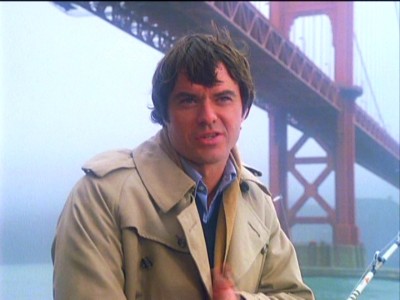
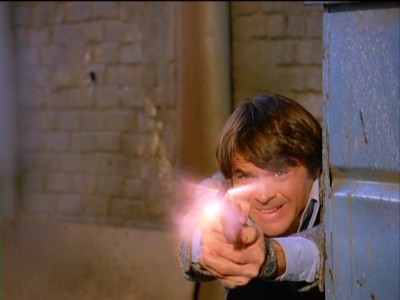
Still...putting the series in context (a highly promoted, expensive show that viewers just weren't cottoning to in large enough numbers), and putting aside the disappointment that no one just pulled Urich aside and said, "Let's try something, anything to make this crazier or sillier or funnier to get some buzz going," you can enjoy this second/second go-around of Vega$ if you truly love this kind of popcorn TV. Case in point is the first episode offered here: Lost Monday. With the episode promo screaming, "Binzer is the perfect killing machine!"the stage was set for some amusing television, immediately confirmed by the cast list, which included Mary Ann Mobley and Dick Sargent (god bless Aaron Spelling). I've written before about how talented Bart Braverman is, and even though Lost Monday doesn't exactly give him much room to show his stuff, he's quite effective showing Binzer's real dismay at losing two days of his life without knowing what happened (and his voice is great, too, when he sings Rock-a-bye My Baby With a Dixie Melody). Still...a true sense of campy abandon eludes this episode, and that's a shame, considering how much fun it would have been to see Binzer as some ersatz Manchurian Candidate. All Kinds of Love doesn't use Phyllis Davis to much more effect than a deluded damsel in distress, but it's always fun to see granite-faced Dennis Cole (part of the extended Spelling family at the time, being married to Charlie's Angels royalty, Jaclyn Smith) as a rat bastard.
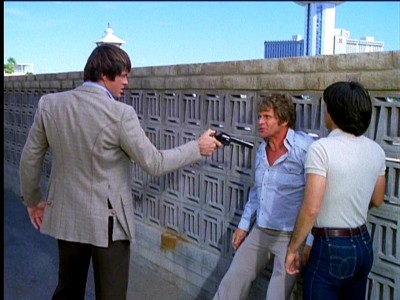
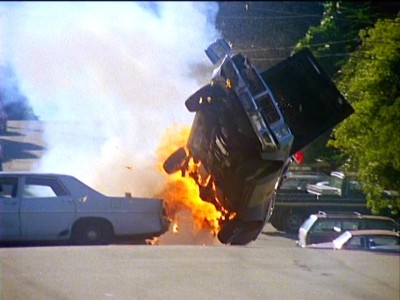
Despite the sure-fire gold title of The Magic Sister Slayings (please give me a time machine to go back and re-do this episode the right way...), nothing of much interest happens here, although there is a classic bad 80s TV/Vega$ moment where Dan, standing up in his racing T-Bird, jousts with pistols against an assassin-terrific. The first stand-out episode from this second-half season is Lido Girls, an appropriately trashy outing featuring the incomprehensible (and therefore, totally rational in SpellingLand) pairing of Gigi's Louis Jourdan and drive-in exploitation god L.Q. Jones in a seedy tale of blackmail and murder, co-starring the creepily-dubbed Christopher Morley, who had a similarly memorable role as a murderous transvestite in Freebie and the Bean. Consortium gives us another chance to ponder the complicated backflips the producers of Vega$ executed to make Dan both Vegas hip and Midwestern moral, when he gently chides a friend/hooker for living the morally bankrupt lifestyle he doesn't judge (huh?) It's always good to see the slick Lloyd Bochner in the kind of role he excelled at: a cultured heel. Where else but in SpellingLand will you see Robert Loggia and the Captain and Tenille show up in the same episode: in this case, The Hunter Hunted? Loggia gives a good account of a man obsessed with revenge against cop Greg Morris, but the scripters drop the ball on the side of making nice when the ending peters out inconclusively. Ratcheting up the fun considerably, though, The Man Who Was Twice delivers exactly what you're looking for in an over-the-top Vega$ episode when female impersonator extraordinaire Jim Bailey essays a very nervous, pale-faced, puffy, sweaty (and unintentionally hilarious) dual personality serial killer (his Judy Garland is killer).
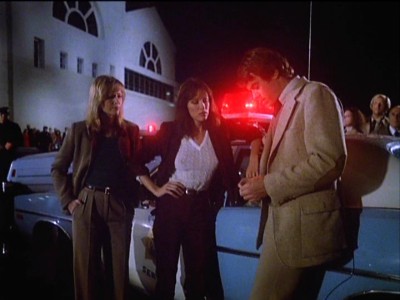
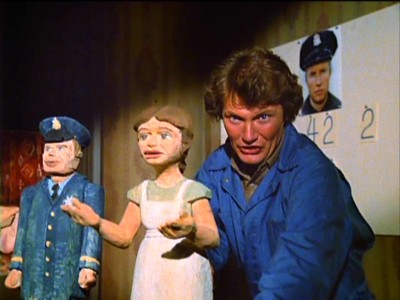
This volume's most solid entry is The Golden Gate Cop Killer, a gorgeously-shot 2-hour special Vega$, with spectacular San Francisco location work in the service of a familiar-but-nicely-outsized story of a crazed psycho (Andy Robinson, coming back to Frisco after Dirty Harry) killing cops. Nothing beats the sight of Robinson talking to the voices (in his head) of his dead parents, represented by these strange wooden dolls ("Hi, Mom! Hi, Dad!")...unless it's the sight of perfectly proportioned beauty Tanya Roberts running around in various stages of undress. If The Golden Gate Cop Killer was meant as a potential pilot for a Vega$ spin-off, it's a shame it didn't fly: Roberts and Michelle Phillips are a good team, run by solid police supervisor, Peter Haskell (Dan sums up the potential of the maybe-series in one sentence: "Now that we're going to be working together...when do you two wear the bikinis?"). Fun set pieces and good action make this one a stand-out. No less impressive (and by that I mean, enjoyably cheap and schlocky) is Siege of the Desert Inn, where Cameron Mitchell (one of fifteen movie and TV appearances in 1980 alone) and the marvelous Richard Bakalyan take showgirls hostage for a heavy-duty ransom. Ridiculous in every way, Siege of the Desert Inn is perfectly-pitched junk; it's a pity more episodes from Vega$' second season couldn't have aimed so low.
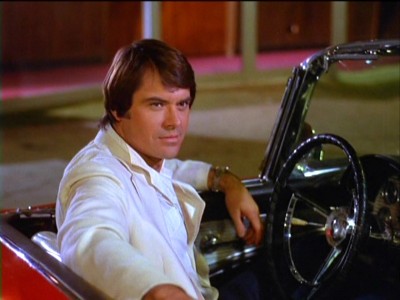
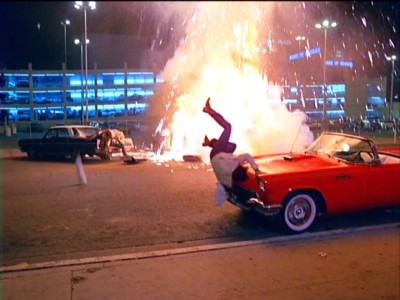
The DVD:
The Video:
The full-screen, 1.33:1 video transfers for Vega$: The Second Season, Volume 2 are acceptable, with reasonable color (a tad faded at times), a medium-sharp image, and the expect screen anomalies. Artifacting is minimal. Please note: as usual with Paramount vintage TV releases, there is a tiny disclaimer stating: "Some episodes may be edited from their original network versions." All of the episodes time out around 50 minutes and change, so Vega$ experts can email if they know of any changes.
The Audio:
The Dolby Digital English mono audio tracks are acceptable, as well, with audible but minimal hiss, and relatively stable recording levels. English subtitles are available.
The Extras:
You can watch the episode promos as one bunch on the individual discs, or you can incorporate them into each individual episode. Fun...but not much of an extra.
Final Thoughts:
Not a big uptick...but an uptick, nonetheless. I wasn't expecting a lot from this second volume of episodes from Vega$'s second season, but some enjoyably pulpy, Spelling-esque episodes do manage to raise the stakes here. For the right viewer, in the right frame of mind: good fun. I'm recommending Vega$: The Second Season, Volume 2.
Paul Mavis is an internationally published film and television historian, a member of the Online Film Critics Society, and the author of The Espionage Filmography.


|
| Popular Reviews |
| Sponsored Links |
|
|
| Sponsored Links |
|
|
| Release List | Reviews | Shop | Newsletter | Forum | DVD Giveaways | Blu-Ray | Advertise |
|
Copyright 2024 DVDTalk.com All Rights Reserved. Legal Info, Privacy Policy, Terms of Use,
Manage Preferences,
Your Privacy Choices | |||||||









